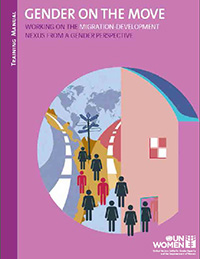UN Report reiterates gender equality is a crucial component of migration
A new UN Women training manual “Gender on the Move” seeks to build capacity for gender analysis among migration policymakers and professionals.Date:
Coinciding with International Migrants Day, UN Women’s global Training Centre today launched a new training manual, “Gender on the Move: Working on the Migration-Development Nexus from a Gender Perspective”.
Designed as a self-learning tool and to guide training workshops, the manual aims to build the gender analysis capacity of migration and human rights for development professionals, so that new programmes and policies can integrate concepts of migration, development and gender equality.
Development organizations agree that there can be no progress in any field without gender equality; yet, many organizations do not recognize the relationship between gender, migration, and development, according to the manual.
The manual recommends new strategies and policies to address the situation, which include analyzing the migration-development nexus from a human development model, recognizing the impact of remittances from a gender perspective, rethinking alternative solutions to traditional structures of care provision, and raising awareness on the need to protect the labour rights of domestic workers, and provide them with sexual and reproductive healthcare.
Drawing attention to the need to analyze economic activity, such as the use of remittances, through a gender perspective, author Allison Petrozziello said, “Remittances-for-development initiatives often ignore how gender influences the sending and spending of migrants’ monetary transfers.”
The manual also urges policymakers to not only protect the rights of domestic workers, but also to re-think the notion of women as primary caregivers and asks for more involvement by men, the State, and the private sector, while also highlighting the persistance practice of unpaid care work.
“Care work is largely absent from the development agenda, despite the fact that women are migrating to fill this gap, often leaving their own families in the care of others. And migrant women’s rights are often assumed to be provided for by policies that are actually gender-blind,” said Petrozziello. “Gender on the Move is an accessible resource to help practitioners and policymakers address all of these topics.”
Calling for an emphasis on a human development model of migration, the manual highlights the violations of rights faced by women migrants, the two most pervasive being their lack of labour rights in domestic work and lack of sexual and reproductive healthcare. There are several factors that contribute to such abuse, including absence of legal regulations and the social invisibility of domestic workers. The manual recommends that labour unions for domestic workers be promoted, and awareness of rights of domestic workers be enhanced, among other actions.
Gender is a crucial component of migration, and if ignored, leads to the design of policies and programmes that not only disregard the crucial needs of both women and men, but are also ineffective in promoting real economic development.
